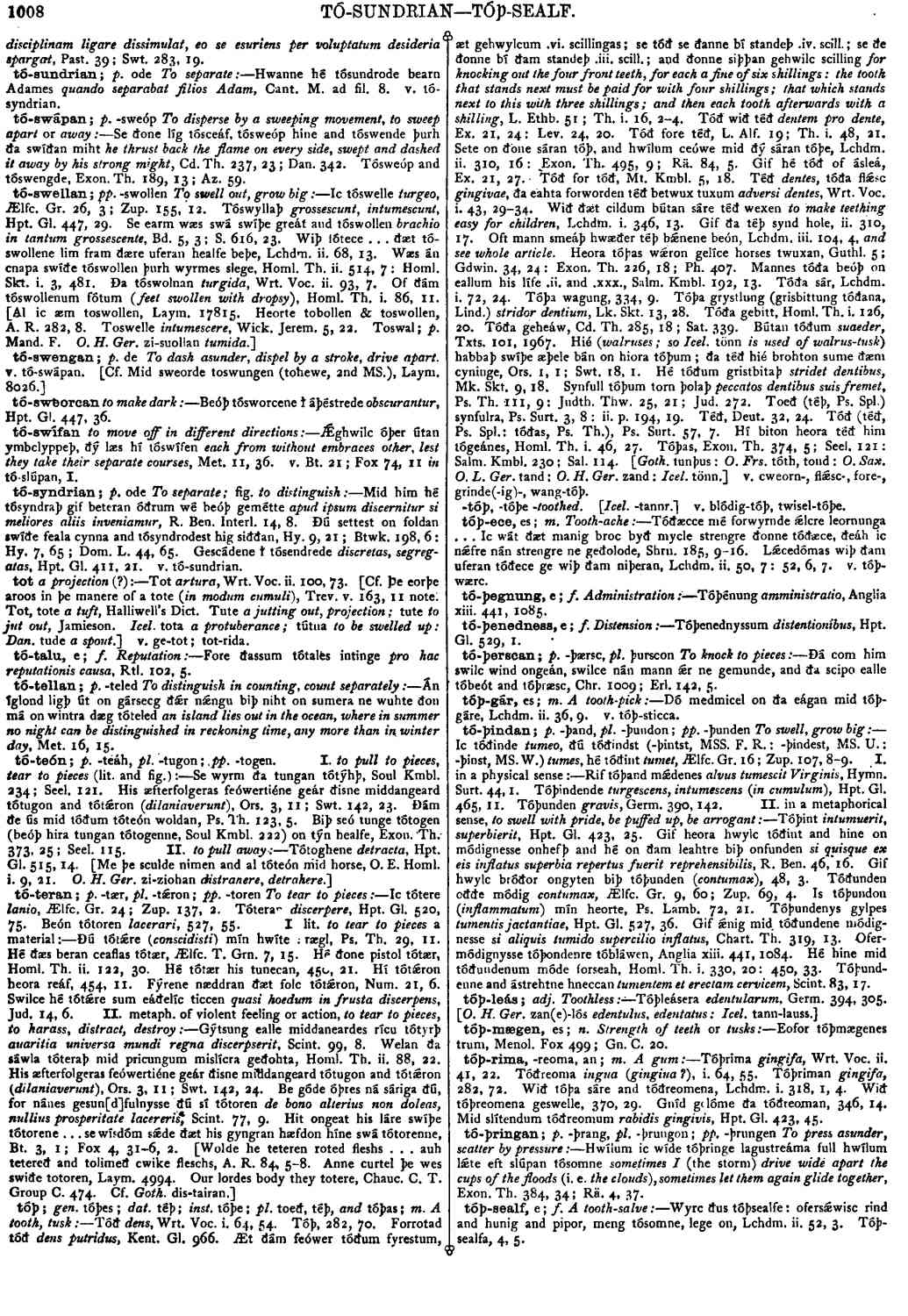tóþ
- noun [ masculine ]
-
Tóð
dens,
- Wrt. Voc. i. 64, 54.
-
Tóþ,
- 282, 70.
-
Forrotad tóð
dens putridus,
- Kent. Gl. 966.
-
Æt ðám feówer tóðum fyrestum, æt gehwylcum . vi. scillingas; se tóð se ðanne bí standeþ . iv. scill ; se ðe ðonne bí dam standeþ . iii. scill. ; and ðonne siþþan gehwilc scilling
for knocking out the four front teeth, for each a fine of six shillings: the tooth that stands next must be paid for with four shillings; that which stands next to this with three shillings; and then each tooth afterwards with a shilling,
- L. Ethb. 51; Th. i. 16, 2-4.
-
Tóð wið téð
dentem pro dente,
- Ex. 21, 24: Lev. 24, 20.
-
Tóð fore téð,
- L. Alf. 19; Th. i. 48, 21.
-
Sete on ðone sáran tóþ, and hwílum ceówe mid ðý sáran tóþe, Lchdm. ii. 310, 16 : . Exon.
Th.
- 495, 9 ; Rä. 84, 5.
-
Gif hé tóð of ásleá,
- Ex. 21, 27.
-
Tóð for tóð,
- Mt. Kmbl. 5, 18.
-
Téð dentes, tóða flǽsc gingivae, ða eahta forworden téð betwux tuxum
adversi dentes,
- Wrt. Voc. i. 43, 29-34.
-
Wið ðaét cildum bútan sáre téð wexen
to make teething easy for children,
- Lchdm. i. 346, 13.
- Gif ða téþ synd hole, ii. 310, 17.
-
Oft mann smeáþ hwæðer téþ bǽnene beón, Lchdm. iii. 104, 4,
and see whole article.
Heora tóþas wǽron gelíce horses twuxan.- Guthl. 5 ; Gdwin. 34, 24: Exon. Th. 226, 18; Ph.
407.
-
Mannes tóða beóþ on eallum his lífe . ii. and .xxx. ,
- Salm. Kmbl. 192, 13.
- Tóða sár. Lchdm. i. 72, 24.
-
Tóþa wagung,
- 334, 9.
-
Tóþa grystlung (grisbittung tóðana, Lind. )
stridor dentium,
- Lk. Skt. 13, 28.
- Tóða gebitt. Homl. Th. i. 126, 20.
-
Tóða geheáw,
- Cd. Th. 285, 18 ; Sat. 339.
-
Bútan tóðum
suaeder,
- Txts. 101, 1967.
-
Hié (walruses; so Icel. tönn
is used of walrus-tusk)
habbaþ swíþe æþele bán on hiora tóðum ; ða téð hié brohton sume ðæm cyninge.- Ors. 1, 1; Swt. 18,
1.
-
Hé tóðum gristbitaþ
stridet dentibus,
- Mk. Skt. 9, 18.
-
Synfull tóþum torn þolaþ
peccatos dentibus suis fremet,
- Ps. Th. 111, 9: Judth. Thw. 25, 21; Jud. 272.
-
Toeð (téþ,
- Ps. Spl. ) synfulra. Ps. Surt. 3, 8 : ii. p. 194, 19.
-
Téð,
- Deut. 32, 24.
-
Tóð (téð,
- Ps. Spl. : tóðas, Ps. Th. ), Ps. Surt. 57, 7.
-
Hí biton heora téð him tógeánes,
- Homl. Th. i. 46, 27.
-
Tóþas,
- Exon. Th. 374, 5; Seel. 121: Salm. Kmbl. 230; Sal. 114.
Bosworth, Joseph. “tóþ.” In An Anglo-Saxon Dictionary Online, edited by Thomas Northcote Toller, Christ Sean, and Ondřej Tichy. Prague: Faculty of Arts, Charles University, 2014. https://bosworthtoller.com/30888.
Checked: 0